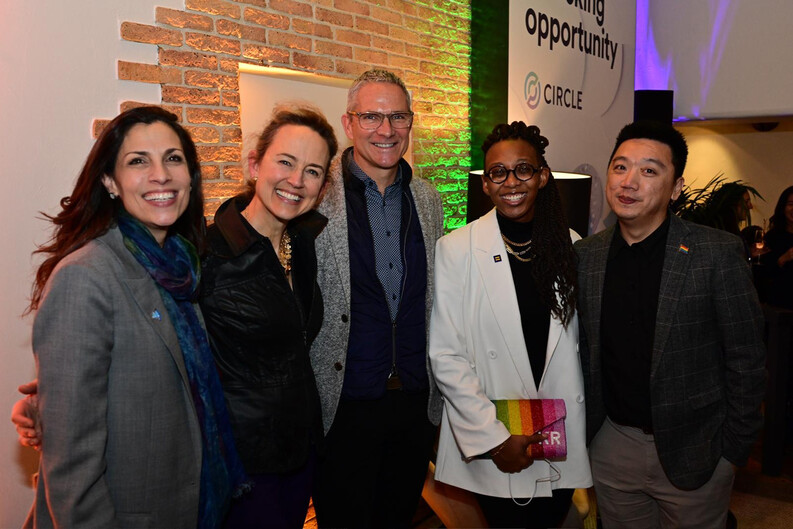Former Tsai Center Visiting Scholar Promotes LGBTQ Workplace Inclusion at Davos

In January, former Paul Tsai China Center visiting scholar Yanhui Peng attended the World Economic Forum in Davos to engage global business leaders about improving LGBTQ workplace inclusion in China. Peng, who has been at the cutting edge of LGBTQ advocacy in China for a decade and recently cofounded the China Rainbow Collective, spoke several times at Pride on the Promenade, an event series organized by the Partnership for Global LGBTIQ+ Equality. Peng traveled to Davos with GLAAD, a major U.S.-based LGBTQ organization he connected with while at Yale.
“Pride is not just something to celebrate at Davos or already LGBTQ-friendly environments,” Peng told audiences. “Indeed, supporting LGBTQ employees is even more crucial in difficult places.”
China remains one such challenging environment. While visibility and support for China’s LGBTQ community has grown over the past several decades, widespread discrimination persists. A large-scale survey conducted in 2016 by the United Nations Development Programme, Peking University, and the Beijing LGBT Center found that less than 5% of LGBTQ respondents were out in the workplace due to fear of discrimination. In 2020, China Southern Airlines let go of a flight attendant after security camera footage of him kissing a man was leaked online. His manager called him “abnormal” and said his behavior went against “socialist core values.” More troublingly, authorities in recent years have shut down several LGBTQ organizations and have tightened censorship.
The spate of negative news can be discouraging.
“Many multinational companies in China have been reluctant to touch LGBTQ issues in China because of political sensitivity,” Peng explained. “Worse yet, they have believed they are powerless to do anything.”
“But our job is to show them that they can, in fact, have an impact,” said Peng.
To give his interlocutors a sense of possibility, Peng shared success stories from China’s LGBTQ movement and his own groundbreaking advocacy. For example, in 2014, Peng won a lawsuit against a “conversion therapist” for consumer fraud, prompting Baidu to remove advertisements for “conversion therapy” from its search results. In 2019, Peng spearheaded a viral campaign calling for the legalization of same-sex marriage in China’s Civil Code, the scale of which was acknowledged by an official spokesperson of China’s legislature. The following year a transgender woman won a lawsuit against her employer for illegal termination of contract. The case’s judge later commented in the journal of China’s Supreme People’s Court that “employment discrimination toward transgender people implies that the personal dignity of transgender laborers had been infringed in violation of the provisions of the Constitution.”
These success stories were not expected by some.
“Most people I spoke with thought that it was not possible for an LGBTQ movement to exist in China,” Peng said. “They were quite surprised.”
Peng also relayed how some multinational companies in China have already begun adopting LGBTQ inclusion policies and practices. They have conducted internal Pride events, built employee resource groups, and provided same-sex partner benefits, like health insurance, even though same-sex relationships are still not legally recognized in China. Such measures can have a large positive influence on LGBTQ employees’ lives, and can also make them more committed to their workplaces. Peng hopes that, as such policies become more common, more employers will feel the need to adopt them as they compete for talent.
Peng was in store for some surprises himself. Once some executives heard about what other companies were doing, they told Peng that their branches in China had started developing LGBTQ employee resource groups, which he had not been aware of. They said they had been too nervous to share this information before.
Representatives from another company stressed the value of sharing best practices on LGBTQ inclusion in China and forming a community that could keep each other informed. In 2021, the Beijing LGBT Center published a report based on interviews with employees at 122 companies in China that surveyed the landscape of LGBTQ workplace inclusion. The attendees welcomed more such research.
While censorship can cut people off from information and each other, gathering and sharing can rebuild bridges and channels for communication. It can also restore hope.
“The event made me excited —vthere are such big communities of LGBTQ people and allies in these companies, and they want to take action,” Peng said. “It exceeded my expectations.”


